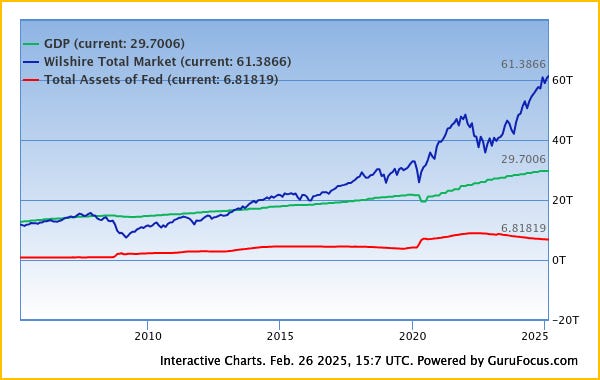Is Buffett saying farewell?
Weekly 9 2025 + marketoverview
Last year, I already had the feeling that Warren Buffett wouldn’t hold on much longer without his partner, Charlie Munger. His enjoyment of the work must have diminished significantly. At 94, after all, that enjoyment is the only thing that matters.
While my suspicion last year was pure speculation, reading Berkshire Hathaway’s newly published letter to shareholders gave me the impression that this is a kind of farewell letter. Maybe not because he wants to step down himself, but rather because he’s starting to doubt whether he’ll still be around next year.
In part of the letter, he describes how he calls his younger sister (91) every day to discuss the merits of aging and the benefits of canes.
Berkshire’s annual meeting will also be shortened, which is certainly understandable. Recently, Buffett even announced that he will no longer be giving interviews.
If you’ve ever dreamed of traveling to Omaha to see Buffett, now is the time.. Let me know if you’re attending, maybe we could meet there.
In the past, the letter to shareholders was always a gem to look forward to. Of course, over the years, it has become more repetitive. Still, I want to highlight two points that stood out to me.
"During the period 2019–2023, I used the words ‘mistake’ or ‘error’ sixteen times in my letters to you. Many other large companies didn’t use these words at all during that time. Amazon did so in its 2021 letter, but for most others, it was just pictures and happy messages."
Here, Buffett emphasizes an important mindset for managers: acknowledging mistakes and misjudgments. This is something I also strive for, as you could probably tell from my communication last year. I share Buffett’s view—I want to speak to you the way I would want to be spoken to if our positions were reversed.
But my favorite passage was this one:
"Mistakes fade away; winners can forever blossom."
This quote reflects his preference for high-quality companies. But it also highlights that we can afford to make some mistakes in our portfolio and still achieve good results. Imagine a 4% position in your portfolio halves in value while your overall portfolio grows by 10% in the same period. That position would then only make up 1.8% of your portfolio. If it remains flat while your portfolio doubles over the next five years, its share drops to just 0.9%.
One thing I always stress, though, is that Buffett has always paid close attention to the price he paid. He never bought anything at fair value—always at a discount.
Marketoverview February 2025
As I write this on Wednesday afternoon, it seems like the entire investing world is waiting for NVIDIA’s earnings, which will be released after the market closes (10:20 PM local time).
For me, it’s a non-event—I’ll read about it later from other writers. Still, in the short term, the numbers could set a clear direction for U.S. markets. Despite already being expensive, the S&P 500 has risen another 1.9% this year. The Nasdaq, on the other hand, has already given up 0.5%—the tech rally is starting to show some cracks.
NVIDIA’s results will either bring relief and push the market higher or disappoint and trigger a decline. The strange thing is that the numbers themselves could be fantastic, but if they fall short of sky-high expectations, that alone could be enough to cause a correction.
For now, though, it’s still abundantly clear that the U.S. stock market is expensive. A correction would only be logical.
The expected returns for the coming years were already shown in the chart I shared last month, and they certainly haven’t improved.
In other words, the U.S. stock market doesn’t need to crash to still deliver a terrible decade.
Europe, meanwhile, has clearly started to catch up. Since the beginning of the year, Germany’s DAX index has already climbed 14%. The FTSE in London lagged somewhat with a 6.7% gain, but it still outperformed the U.S. market, while the Euronext 100 rose 9.8%.
Notably, investors are beginning to reposition themselves. It’s still early in the year, and I don’t have hard data to confirm this, but based on price movements, it seems that this repositioning is happening primarily at the index level.
At that level, Germany, France, Italy, and the Netherlands are by no means cheap either, with expected returns ranging from 1.5% to 2.8%. That’s better than the -0.2% expected for the U.S. market, but still not enough to adequately compensate for the risk of equities.
However, outside the indexes, there are still attractive, profitable, and undervalued companies to be found. That’s why we continue to focus on individual stocks rather than the broader market.
For now, our companies rely on their own strengths and their good (or less good) results to determine their stock prices. For investors in small European stocks (micro-, small-, and mid-caps), the right moment doesn’t seem to have arrived yet.
You’ll receive the details of our own Doubler Portfolio next week.
Articles and Updates this week
On Monday, I introduced a new company where it became clear that our long-term perspective makes a difference in how we view the stock.
There were plenty of earnings reports last week:
Deceuninck and Stellantis also reported earnings on Wednesday. Initially, the market reacted with a clear shock. For Deceuninck, I didn’t understand why; for Stellantis, I did. However, neither changes our investment thesis.
I’ve already analyzed and written up the reports—I’m just waiting for the data provider to update the figures so I can double-check everything. I’ll send out these analyses as soon as possible.
On Tuesday, the fifth lesson in our Introduction to Value Investing series was published: The Circle of Competence.
I’ve decided to complete this series before writing other articles in between. It’s simply a matter of efficiency, especially in this busy period with so many annual reports coming in.



